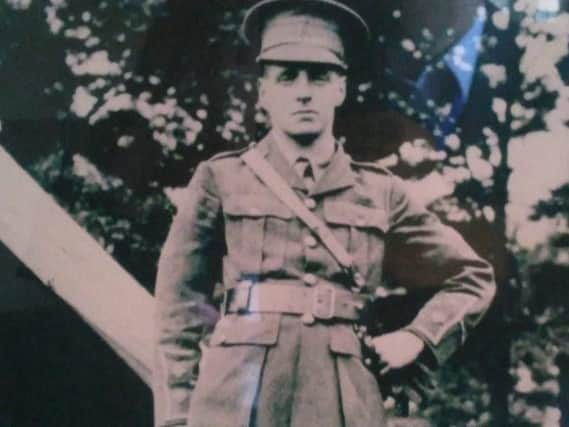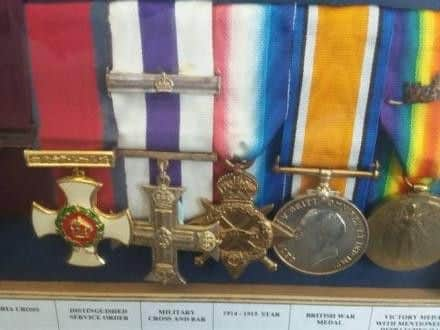Sheffield's most decorated First World War soldier to be remembered with ceremony fit for a hero


Sheffield will remember one of its most heroic sons, whose four acts of bravery and gallantry saved hundreds of lives during the First World War, on Saturday 3 September at 1pm when he has a plaque unveiled in the city centre.
The plaque will be unveiled at the Cenotaph war memorial in Sheffield city centre in honour of Major William Barnsley Allen (1892-1933), who was a British Army medical officer decorated for gallantry four times during the First World War.


Advertisement
Hide AdAdvertisement
Hide AdMajor Allen, who also studied for a degree in medicine at the University of Sheffield, was awarded the Victoria Cross (VC) in 1916, the highest and most prestigious award for gallantry that can be awarded to British and Commonwealth forces.
Members of the public are invited to the ceremony, which will take place in Barker’s Pool and last for approximately half an hour.
The ceremony is the second of three memorial services to commemorate the Sheffield-born recipients of the VCs awarded during the First World War – each will be installed to mark the 100th anniversary since they were awarded.
Last year, there was a ceremony to lay a plaque in honour of Sgt Maj John Raynes and next year, Private Arnold Loosemore will be honoured.


Advertisement
Hide AdAdvertisement
Hide AdThe Right Worshipful Lord Mayor of Sheffield, Cllr Denise Fox, said: “Major William Allen was a much decorated war hero and Sheffield is rightly very proud of him.
William Barnsley Allen
“In this period of commemoration for those associated with the First World War, it will be an absolute privilege to stand alongside his family to make a permanent memorial to his valour and honour in the city centre.”
Representatives from the Army Medical Services Reserves, Army Cadets, Sheffield University Officer Training Corps (UOTC) and Royal British Legion will be present to pay their respects to Major Allen.
The Lord Mayor, Lord Lieutenant, The High Sheriff John Holt, Master Cutler Craig McKay and a representative from the Royal Military College will be laying wreaths at the Cenotaph.
Advertisement
Hide AdAdvertisement
Hide AdWilliam Barnsley Allen was born in Sheffield on June 8th 1892 at 14 Botanical Road, Sheffield, the son of a successful commercial traveller.
William was educated at what was then St Cuthbert’s College, Worksop. In 1908 at the age of 17 he went to Sheffield University. He graduated with an honours degree in June 1914.
During his time at the University he was awarded the Gold Medal in Pathology (1913), the Kaye Scholarship for the highest marks in physiology and anatomy and three bronze medals.
He joined the Royal Hospital as an assistant house physician but, within weeks, he had enlisted with the Third West Riding Field Ambulance. In fact, his date of enlistment is given in the records as 8th August 1914, four days after the outbreak of war. He was soon in France.
Advertisement
Hide AdAdvertisement
Hide AdOn 3 September 1916, near Mesnil, France, when gun detachments were unloading high explosive ammunition, the enemy suddenly began to shell the battery position. The first shell fell on one of the limbers, exploded the ammunition and caused several casualties. Captain Allen at once ran across under heavy shell fire and started attending to the wounded.
He was hit four times by pieces of shell, but went on with his work until the last man had been attended to and removed.
He then went to tend a wounded officer and only then reported his own injuries. For this action, he was awarded the Victoria Cross.
In September 1916 Allen, by then promoted to Major, was awarded the Military Cross for similar acts of heroism.
Advertisement
Hide AdAdvertisement
Hide AdIn 1917 he was awarded a bar to his Military Cross for conspicuous gallantry and devotion to duty after leading a search for wounded men after an intense bombardment of a town with high explosive and gas shells. Although seriously gassed, he continued to perform his duties with the greatest devotion and gallantry, until eventually evacuated to the Casualty Clearing Station.
Finally in October 1918 he organised the collection of wounded from ground under continuous hostile shell fire, and by his inspiring example, untiring energy and contempt of danger, he was able to move large numbers of helpless wounded from positions of danger before he was himself gassed.
He also received a mention in despatches at the end of the war and his Victoria Cross is held at the Army Medical Services Museum in Camberley, Surrey.
He died in 1933, aged just 41.
William Allen was a member of Sheffield UOTC whilst he was studying medicine. Just off the main mess in the Somme Barracks, home of Sheffield UOTC, there is an ante-room named the Allen VC Room which displays on the wall a framed photograph of William, along with the citation as well as a copy of his VC and several of his other medals.